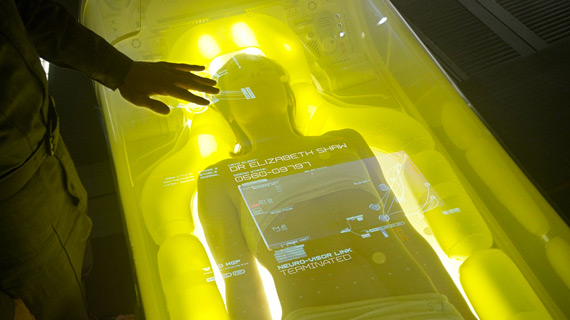
How to Manage a Distributed Remote Team Nov 23, 2024


How to Secure CRM Software and Ensure Data Privacy Sep 30, 2024



How NLP Can Transform Your Communication Skills Aug 27, 2024

Essential HVAC Maintenance for Rental Properties Aug 26, 2024

Maximizing Equipment Lifespan with CMMS Software Aug 08, 2024

Top Business Tools for Streamlining Your Operations Aug 01, 2024
The Crazy But Plausible Hibernating Plan Scientists Have To Send Astronauts To Mars
Aug 27, 2013 20:41

Will we ever be able to send astronauts further into space? How do we get them to live on a spaceship for six months without growing crazy?
The answer: put them to sleep. Scientists have been exploring various ways to get astronauts to hibernate on the way to Mars. It is indeed a huge challenge. Sleeping has its complications. For one, you'll need to ensure they get fed and hydrated while they are sleeping. And then, you'll need to figure out how to keep their muscles from atrophying and prevent bone loss from extended stay in zero gravity.
Here are some of the ideas.
Drop Their Body Temperatures
One of the ideas is to induce a state of therapeutic hypothermia. They would drop the astronauts' body temperatures to consume less energy. John Bradford, who's been working on the hibernation problem about benefits, explained that for every single degree of body temperature drop, its metabolic rate drops 5 to 7 percent. Researchers hope to get a 10 degree drop which would mean a 50 to 70 percent reduction in metabolic rate."We're not freezing anybody," said Bradford. "It's not cryopreservation; it's closer to hibernation. So they're still breathing, and they still need sustenance." Astronauts will still need life support, so they would be hooked up to breathing machines and food delivered through an IV.
For the moment, the current record keeping a human in an induced hypothermic torpor is ten days. NASA is hoping to boos that to six to nine months, just enough for a trip to Mars.
Pump Them Full of Drugs
Scientists explored the possibility of hibernation and focused on a number of drugs that could induce the sleeping state. One of it was known as DADLE (d-ala d-leu-enkerphalin).Scientists were able to put ground squirrels to sleep using the drug during the summer months and saw no adverse side effects when they woke up again.
However, using a drug like that on humans is more complicated. Scientists remain optimistic since DADLE resembles the checmicals found in hibernating animals like bears.
"The molecule DADLE is similar to others we have in the human brain and resembles one of the hibernation triggering proteins in hibernators," said Prof. Marco Biggiogera a few years ago on behalf of the European Space Agency. "It can reduce the energy required by cells, whether isolated in cultures, or present in other animals or organisms."
Will they be able to accomplish such a feat? Or will the warp drive be invented before then? [Space.com, Nature, NASA, The Guardian, Twitter / @bethbeck]

Let’s be honest; OTT platforms have completely changed our movie-watching experience and made entertainment just a click away. A few years ago, who would have thought that watching regional or international movies could be this easy, convenient, and tailored to our budget and preferences? And, yet here we are enjoying the options of Marathi, Malayalam, Hindi, Gujarati, Tamil movies, and a lot more at our fingertips. Read more
TECH NEWS
May 03, 2025 21:31

Electronic Logging Devices (ELDs) have revolutionized the trucking industry by streamlining logging practices and ensuring compliance with federal regulations. Designed to monitor a vehicle’s engine and automatically record driving hours, ELDs replace traditional paper logs and provide an efficient solution for tracking Hours of Service (HOS). If you're looking to complement your fleet's technology, partnering with tools like a reliable truck dispatch service can further optimize operations and keep your business running smoothly. Read more
TECH NEWS
Apr 09, 2025 17:27

The HONOR Magic 7 Pro price in ksa makes it an appealing option for those looking for a high-end smartphone. This advanced device stands out with its sleek design and robust build quality. This blog delves into the details, examining what makes the HONOR Magic 7 Pro unique, from the materials used to its overall durability and user experience. If you’re considering purchasing a high-end smartphone that balances aesthetics and functionality, this review of the HONOR Magic 7 Pro’s design and build quality will provide you with all the information you need. Read more
TECH NEWS
Jan 11, 2025 14:55
Copyright © Fooyoh.com. All rights reserved. User Agreement | Privacy Policy | Contact us
| Advertising
| About us
| Careers


















































